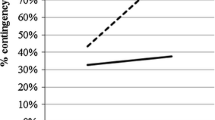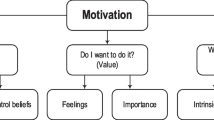Abstract
Solving a mathematical problem in the social context of classroom- cooperation in peer groups implies both the interactive accomplishment of a sequence of appropriate problem-related steps and the communication about a division of the activities among the participants. Related to ERICKSON’s concepts of “academic task structure” and “social participation structure” the extensional analysis of a peer-group-work reveals a mutually dependent relationship between these two structures. Finally, some conclusions for the organization of group work will be presented.
Zusammenfassung
Das Lösen einer mathematischen Problemaufgabe innerhalb des sozialen Kontextes von Gruppenarbeit erfordert sowohl die interaktive Hervorbringung einer problembezogenen Handlungssequenz als auch die Verständigung über die Arbeitsaufteilung. Unter Bezugnahme auf ERICKSONs Begriffe der “academic task structure” und der “social participation structure” deckt die detaillierte Analyse einer Partnerarbeit die sich wechselseitig bedingende Beziehung zwischen diesen beiden Strukturen auf. Abschließend werden einige Schlüsse im Hinblick auf die Organisation von Gruppenarbeit vorgestellt.
Similar content being viewed by others
Literatur
BAUERSFELD, H. (1984). Ergebnisse und Probleme von Mikroanalysen mathematischen Unterrichts. In: W. DÖRFLER & FISCHER, R. (Hrsg.): Empirische Untersuchungen zum Lehren und Lernen von Mathematik. Wien: Hölder-Pichler-Tempsky
BAUERSFELD, H. et al. (1986): Interaktionsanalyse von Mathematikunterricht. Methodologische Annahmen und methodisches Vorgehen. Bielefeld, Papier anläßlich der Bundestagung der Gesellschaft für Didaktik der Mathematik im März 1986 in Bielefeld
BECK, Ch. & Maier, H. (1994): Mathematikdidaktik als Textwissenschaft. Zum Status von Texten als Grundlage empirischer mathematikdidaktischer Forschung. In: Journal für Mathematikdidaktik 15 (1/2), 35–78
BOHNSACK, R. (21993): Rekonstruktive Sozialforschung. Einführung in Methodologie und Praxis qualitativer Sozialforschung. Opladen: Leske + Budrich
COBB, P. (1995): Mathematical Learning and Small Group Interaction: Four Case Studies. In: COBB, P. & BAUERSFELD, H. (Hrsg.): The Emergence of Mathematical Meaning: Interaction in Classroom Cultures. Hillsdale, NJ.: Lawrence Erlbaum
COBB, P. & WHEATLEY, G. (1988): Children’s Initial Understanding of Ten. In: Focus on Learning Problems in Mathematics 10 (3), 1–28
DAVIDSON, N. & LAMBDIN KROLL, D. (1991): An Overview of Research on Cooperative Learning Related to Mathematics. In: Journal for Research of Mathematics Education, vol. 22 (5), 362–365
ERICKSON, F. (1982a): Classroom Discourse as Improvisation. In: WILKINSON, L. Ch. (Hrsg.): Communicating in the Classroom. New York usw: Academic Press
ERICKSON, F. (1982b): Taught Cognitive Learning in its Immediate Environments: A Neglected Topic in the Anthropology of Education. In: Anthropology & Education 13 (2), 149–179
ERICKSON, F. (1986): Qualitative Methods in Research on Teaching. In: WITT-ROCK, M. C. (Hrsg.): Handbook of Research on Teaching. New York: Macmillan, third edition
KRON, F. W. (1988): Grundwissen Pädagogik. Basel: E. Reinhardt (UTB für Wissenschaft — große Reine)
KRUMMHEUER, G. (1992): Lernen mit ‘Format’. Elemente einer interaktionistischen Lemtheorie. Diskutiert an Beispielen mathematischen Unterrichts. Weinheim: Deutscher Studienverlag
KRUMMHEUER, G. (1995a): The Ethnography of Argumentation. In: COBB, P. & BAUERSFELD, H. (Hrsg.): The Emergence of Mathematical Meaning: Interaction in Classroom Cultures. Hillsdale, N. J.: Lawrence Erlbaum
KRUMMHEUER, G. (1995b): Der mathematische Anfangsunterricht. Anregungen für ein neues Verstehen früher mathematischer Lehr-Lem-Prozesse. Weinheim: Deutscher Studienverlag, 2. Auflage
KRUMMHEUER, G. (1997a): Narrativität und Lernen. Mikrosoziologische Studien zur sozialen Konstitution schulischen Lernens. Erscheint im Deutschen Studienverlag Weinheim
KRUMMHEUER, G. (1997b): Zum Begriff der “Argumentation” im Rahmen einer Interaktionstheorie schulischen Lernens und Lehrens. Erscheint im ZDM
MEHAN, H. (1979): Learning Lessons. Cambridge: Harvard University Press
MILLER, M. (1986): Kollektive Lernprozesse. Frankfurt am Main: Suhrkamp
STACEY, K. (1992): Mathematical Problem Solving in Groups: Are Two Heads Better Than One?. In: The Journal of Mathematical Behavior, vol. 11 (3), 261–275
STEFFE, L. P.; Cobb, P.; von Glasersfeld, E. (1988): Construction of Arithmetical Meanings and Strategies. New York: Springer-Verlag
VOIGT, J. (1984): Interaktionsmuster und Routinen im Mathematikunterricht. Weinheim: Beltz
WILKINSON, L. Ch. (Hrsg., 1982): Communicating in the Classroom. New York usw: Academic Press
Author information
Authors and Affiliations
Rights and permissions
About this article
Cite this article
Vollmer, N., Krummheuer, G. Anfängen — Schreiben — Machen — Helfen Zur Beziehung zwischen Arbeitsteilung und Aufgabenverständnis während einer Partnerarbeit im Mathematikunterricht. JMD 18, 217–244 (1997). https://doi.org/10.1007/BF03338848
Published:
Issue Date:
DOI: https://doi.org/10.1007/BF03338848




